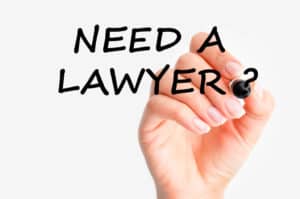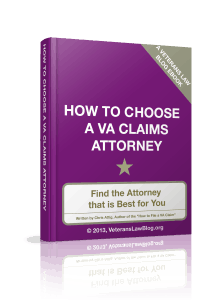There is a lot of misunderstanding about whether and when a Veteran can retain an accredited Veterans Benefits attorney to represent the Veteran in a claim for disability compensation before the VA.
And there is even more misunderstanding out there about what attorneys can – and do – charge Veterans for representation in a VA Claim or Appeal.
You can hire an attorney anytime in the process.
Some attorneys and Veterans Service Organizations (VSOs) will tell you that you cannot hire an attorney to represent you before the issuance of a Notice of Disagreement.
This is patently FALSE. It is one of the many myths about attorneys that represent Veterans.
Here’s the TRUTH about hiring a Veterans Benefits Attorney.
An attorney can represent you at ANY time in the VA Claims Process.
They can, however, only charge you a fee for representation (for claims which were denied on/after June 20, 2007) after a Notice of Disagreement has been filed.
A Veterans Benefits attorney can represent a Veteran before the filing of a Notice of Disagreement (in an original claim) on a pro bono basis only
There is one exception – and these cases are getting more and more rare:
If your claim was denied by the VA prior to June 20, 2007, an accredited agent or attorney is only permitted to charge fees for services after the Board of Veterans’ Appeals issued a first final decision in the case.
Now, this begs the question: can you hire an attorney help you BEFORE the VA denies your claim?
Yes, you absolutely can.
But the attorney cannot charge you a fee.
The attorney can charge you for the costs of representing you – the costs of getting records or experts, the cost of traveling to your hearings, etc. An attorney is always – in any area of any law or benefits structure – entitled to ask a client to reimburse expenses, whether working pro-bono or for a fee.
And this is why many law firms and lawyers tell Veterans that they do not handle claims before a decision is issued: they cannot recover a fee for their work, and so they are giving away their time.
For attorneys that have overhead to cover and employees to pay – a business to run – giving away time for free is not a luxury most of us can afford.
My firm does set aside a substantial amount of “free” time to help certain Veterans – we reserve a percentage of time to help certain homeless Veterans in certain communities each year in the development of their claims.
But for the rest of the Veterans that contact us seeking help, most law firms charge for their services.
What Fees can an Attorney Charge a Veteran at the Administrative Level?
The “myth” out there is that attorneys can only charge a 20% fee. This is just a myth. Here’s the reality:
The attorney representing a Veteran at the Administrative Level – meaning, before the Regional Office after an adverse Ratings Decision all the way up through a BVA Decision – can charge any fee that is reasonable.
The law governing Veterans Benefits does, however, give some guidelines about what is – and what is not – reasonable. Here are the general rules:
Rule #1: A Fee that is 20% (or less) of past due benefits is presumed by the VA to be a reasonable fee
Rule #2: A Fee that is greater than 33 1/3 % (one-third of past due benefits) is presumed to be an unreasonable fee.
Keep in mind that Rule #1 and Rule #2 are presumptions – meaning that they can be rebutted. In other words, there are situations when a fee that is less than 20% of past-due benefits might be UNreasonable, and there are times when a fee greater than 33 1/3% might be reasonable.
A Veteran who challenges an attorney’s 20% fee has the burden of showing Clear and Convincing evidence that a fee is UNreasonable.
An attorney who claims a fee that is greater than 33 1/3% has the burden of showing Clear and Convincing evidence that the fee is Reasonable.
What factors will be considered in weighing the reasonableness or unreasonableness of a fee? Here they are:
(1) The extent and type of services the representative performed;
(2) The complexity of the case;
(3) The level of skill and competence required of the representative in giving the services;
(4) The amount of time the representative spent on the case;
(5) The results the representative achieved, including the amount of any benefits recovered;
(6) The level of review to which the claim was taken and the level of the review at which the representative was retained;
(7) Rates charged by other representatives for similar services; and
(8) Whether, and to what extent, the payment of fees is contingent upon the results achieved.
It is worth noting that those same criteria are set by most state bars when addressing complaints that an attorney violated state ethics rules by charging an unreasonable fee.
Not every state bar uses the same exact language, and how state bars interpret those factors can vary greatly, but keep that in mind if you think your attorney charged an unreasonable fee.
What Fees can an Attorney Charge a Veteran at the Veterans Court?
Attorneys can charge Veterans the same fees at the Veterans Court that they charge at the Administrative Level.
But only if they get paid past-due benefits in a Decision of the Veterans Court.
Most Veterans Court cases aren’t out-and-out wins for the Veteran. In fact, something around 70-80% of Veterans Court cases are remands for readjudication, referrals for adjudication in the first place, or vacated BVA decisions to fix an error of law.
So, in those cases, an attorney can still receive compensation.
If an attorney represents a Veteran at the Veterans Court and substantially prevails, the attorney can have their hourly rate paid by the VA.
The law that allows this to happen is called the Equal Access to Justice Act, or EAJA (pronounced EE-jah). That law says, in a nutshell, that if you have the stones to fight the deep pockets of the Federal Government in a Federal Court – and if you substantially prevail – the VA owes the attorney his or her hourly rate.
Now, 2 key points:
First, the phrase “substantially prevail” is complex, and goes far beyond the scope of this post.
Generally speaking, if an attorney gets a Remand Order from the Veterans Court – one of the most common outcomes – the attorney will be deemed to have “substantially prevailed”.
Second, the hourly rate that the attorney is paid is NOT his or her actual hourly rate.
It is an hourly rate set by law a couple decades ago at $125 per hour, adjusted for inflation and geography. At such hourly rates – the EAJA rate for a Dallas ,Texas attorney is somewhere around $185 per hour – attorneys representing Veterans do not get rich.
They earn just enough to stay in business.
Now, keep this in mind, too. Your VA accredited attorney cannot get BOTH fees in the same case for the same issue.
So, if your attorney gets your Extra-Schedular Total Rating claim remanded and recovers an EAJA Fee at the Veterans Court, and then wins the case for you at the BVA or the Regional Office, the attorney cannot keep both the EAJA fee and the contingency fee.
The general rule of thumb is that the attorney must refund the lower of the 2 fees to the Veteran.
This is known as the “EAJA Offset” and I’ll discuss it in greater detail in another post.
Learn the 8 Things that Veterans Should Know Before Hiring an Attorney in their VA Benefits Claim or Appeal.
Don’t just run out and hire the first attorney you talk to. When it comes to VA Disability Claims, not all attorneys are the same.
Did you know that to lawfully represent Veterans before the VA, an attorney has to be accredited by the VA? Is your Attorney accredited?
Did you know that there are certain questions that you should ask ANY attorney you are considering hiring in your VA Disability claim?
Did you know that many attorneys narrowly focus their VA disability claims on certain types of claims?
Did you know that – on average – a Veteran will be declined representation by an attorney 5-7 times before they find the attorney they like the best?
Learn these things – and more tips about hiring an attorney in your VA Disability Claim – in my FREE eBook: “8 Things Veterans Should Know Before Hiring a VA Attorney”.
Then, head back to the Veterans Law Blog and start learning the 8 Steps to Improve your VA Disability Claim…starting this process now will make you a much better, and more informed, client when you do hire a law firm to help you in your VA appeal or claim.
The Veterans Law Blog publishes a guide to help you in choosing an attorney – you can download an eBook version for free, by clicking here, or you can spend a couple bucks and get the publisher to ship you a paperback copy.







